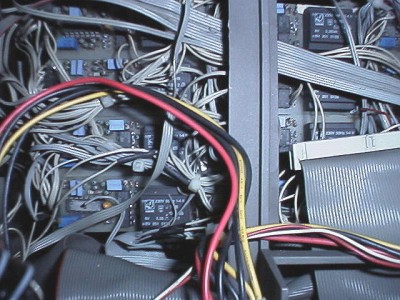

For a few weeks now I have been reading a lot about the Mac mini, especially the hacks. People opening the Mac, upgrading its memory. Someone put a PC into the same case. And now it seems you can even overclock it. Leo Bodnar was able to overclock his Mac mini to 1.42GHz (original 1.25GHz).
I have never actually overclocked a processor. In the past I did tweak the memory controller of my Acorn Archimedes. Changing a register in the controller changed the access speed to the ROM, and hence made the computer a bit faster since the Archimedes has its OS in ROM.
But I did do real hardware hacks, like changing the video circuitry of my ZX Spectrum, replacing the half working 64 Kbytes memory with working 64 Kbytes, so I could switch between two memory banks. This was great when I was developing software on it. Remember, in those days an assembler had to be loaded from cassette tape. Putting the assembler in one bank, switching and then running the code was a great time saver if the code crashed the computer.
I also did some real hardware hacks inside my Acorn Archimedes, like replacing the 1 MB memory with 4 MB. The whole process took several hours. The original RAM had to be cut from the board, then I had to desolder the legs one by one. Some copper traces had to be cut and removed, and new connections had to be made. I used wire wrap wire to make the new connections.
I even made my own ARM3 processor upgrade, which involved a home built socket converter and a lot of wire wrap wire connections (soldered). Some other hacks improved the video circuitry (VIDC "overclocking") and even a joystick interface. This experience came in handy later when I started my own company, Castle Amber, and together with a friend made PhoneBase, a voice recording solution.

I designed the 16 channel analogue-to-digital converter card, which included a sophisticated buffering system involving two memory banks. My friend designed the phone interface cards and most of the software. It was a lot of fun and hard work, and we learned a lot. Sadly, only the prototype was sold. Despite it being a prototype, with a lot of wires (see photo), it was in use for several years.
But back to the Mac mini. I have plans of buying one myself. I expect the Mac mini to get very popular, maybe as popular as the iPod. I even think that it will do what many people are hoping GNU/Linux will be able to do one day, taking a significant piece of the desktop market from Microsoft.
In my opinion there are a few things wrong with GNU/Linux that Apple's solution don't seem to suffer from:
Moreover, the Mac mini is sexy, small and Apple is a well know name. Rent a random movie on DVD and you see either an Apple or a Sony Vaio being used.
In my opinion (again) quite some Open Source / Linux developers seem to either focus on things that are requested by a few (like skinning, meaning changing the appearance of a program) or cloning existing programs. Also, somehow the original Unix philosophy got lost: small specialised programs that can be combined to reach a certain goal. I had recently a short peek at Eclipse, and the editor is far from sufficient for serious Perl programming for example. Maybe they take "an open extensible IDE for anything and nothing in particular" too serious. For example I love to be able to split my editor Window. The editor that comes with Eclipse can't do this, while a simple editor like Textpad supports this for quite some time.
OpenOffice is an example of the latter category, it comes close to Office, but I consider it as cumbersome to use as the original Microsoft Office.
Another problem Linux suffers from is Open Source. Problem? Yes. Open Source is the reason why I still use Windows XP for most of my work, because it's available for Windows XP as well. Moreover, I am quite able to keep my Windows XP secure. Also at the moment there are no applications yet tempting me to switch to Linux permanently.